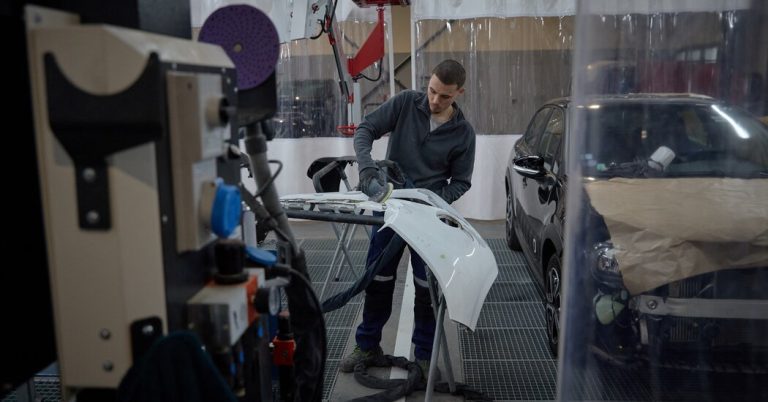France is entering a period of austerity as the wars in Ukraine and Gaza, economic slowdowns in Germany and China and record high interest rates weigh on growth more than expected.
The French will face 10 billion euros ($10.8 billion) in cuts to government spending, on issues such as environmental subsidies and education, the government announced Thursday, on top of 16 billion euros in cuts announced a few months ago. Finance Minister Bruno Le Maire on Monday revised up his forecast for economic growth this year to 1 percent, from 1.4 percent at the end of last year.
“Lower growth means lower tax revenues, so the government has to spend less,” Mr Lemaire told a news conference.
After lavish spending during the pandemic to prop up the economy and protect consumers from high energy prices, France is now at risk of breaching European Union fiscal rules that limit government borrowing. To avoid this, the government needs to cut costs to reduce the deficit to 4.4% of gross domestic product this year, from 4.8%.
Paris is increasingly worried about the downgrade of French debt by international rating agencies, a move that will raise borrowing costs.
The French slowdown mirrors the tepid recovery across Europe, which has failed to rebound as quickly as the United States, where the economy, although slowing from breakneck growth, continues to be fueled by consumer spending.
Economic growth has flattened in the 20 countries that use the euro: no growth in the last three months of 2023 compared to the previous quarter, narrowly avoiding recession after contracting in the third quarter. For the year, the eurozone grew just 0.1%.
“The real issue is the development gap between Europe and the Americas,” said Mr Le Maire. “That’s the elephant in the room.”
Budget cuts are a new challenge for President Emmanuel Macron. Now in the middle of his second term, he has attracted hundreds of billions in investment commitments from multinational companies in recent years. These include the creation of four huge electric car battery factories in northern France and a boosted pharmaceutical industry with new investments from Pfizer as well as Novo Nordisk, which will expand production in France of the popular slimming drugs Ozempic and Wegovy.
But elsewhere, a slowdown was noticeable. Unemployment, which fell last year to a 15-year low of 7 percent, has risen as manufacturers cut output and exports slowed. Consumers, wary of high inflation, have also cut spending, a key driver of growth.
At the same time, Mr Macron is trying to counter the rise of Marine Le Pen’s far-right National Rally party, which has seized on the economic slowdown, immigration issues and regulatory demands imposed by the European Union to woo disenchanted voters.
Last month, Mr Macron rebooted his government, appointing a new prime minister, his 34-year-old protégé Gabriel Attal, who called for a political and economic “re-equipment” of France. Mr Macron also promised more pro-business measures and pledged to reduce France’s debt.
Mr Le Maire said Europe’s anemic output was particularly worrying because structural issues, including environmental, labor and other regulatory standards, were making it harder to narrow the competitive gap with the United States.
Europe’s recovery has also been held back by a protracted energy crisis that has hit industry-dependent Germany, Europe’s largest economy and France’s biggest European trading partner, hard.
And European governments are frustrated by President Biden’s deflationary law, which some see as a protectionist industrial policy that threatens their economies. The European Union is pursuing its own clean energy subsidies in response to US incentives.
The European Central Bank’s highest interest rates in history didn’t help. Inflation has started to ease, but high borrowing costs continue to constrain business activity and dampen the property market in parts of Europe, including France, where house prices fell last year as a downturn in bank lending slowed the housing market.
Sales of existing homes in France fell 20% in the 12 months to October, compared with a year earlier, while sales of new homes fell almost 40%, according to government data.
“The economic slowdown is the price we have to pay for our victory over inflation,” Mr Lemaire said.
Budget cuts in France, introduced by government decree on Thursday, will limit spending on key state agencies, including education, justice and defence. A huge chunk, around €2 billion, will come from a program to help households and businesses meet strict EU environmental standards.
The cuts were deemed necessary after the government paid a raft of unexpected costs this year to deal with several crises, including €400m to help angry farmers who had threatened to block Paris over rising costs, cheap imports and EU red tape, as well as pay police officers more money ahead of the summer Olympics in the French capital. The government has also pledged an additional €3 billion in aid to Ukraine.




